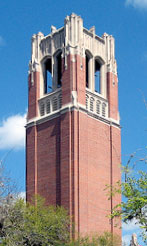 Image via WikipediaI am interested in this session because I want to get an idea about how much work it takes to support Sakai on a large scale. The change management process and support are critical issues for us. I need to know how to talk about our issues with Sakai to support vendors like rSmart, Unicon, and Longsight. I am discovering over this last year that I need to really get under the hood to get a common language with support folks.
Image via WikipediaI am interested in this session because I want to get an idea about how much work it takes to support Sakai on a large scale. The change management process and support are critical issues for us. I need to know how to talk about our issues with Sakai to support vendors like rSmart, Unicon, and Longsight. I am discovering over this last year that I need to really get under the hood to get a common language with support folks.All changes at U of F are load tested - no matter how small the changes and tested against monitoring scripts. All changes require a full two weeks of testing time. This is even for a single script change for a single instructor.
Why do public speakers still use language like "off the reservation"?
Martin talked about the usefulness of collaboration between institutions for problem-solving.
Pattern: maintenance for a new build - session replication for seamless upgrades is missing in Sakai. Sakai needs more flexibility.
One of the admins in the room does restarts on Sundays at 10:00 AM. The idea is that no real student is up at that time.
They are hosting Sakai on 8 servers. Only a few people here have a DBA. They have a single sign-on system with Shibboleth.
The presenters philosophy revolves around "Design Patterns" - A general reusable solution to a commonly occurring problem.
Their support staff get bug reports and THEY CALL STUDENTS AND CUSTOMERS BEFORE THEY REPORT A PROBLEM! They track what kinds of problems people have and send that to their support desk.
As the University of Florida's Sakai implementation grows, our Sakai system has begun to regularly exceed 3,000 user sessions at any given time. This presentation will share some of the strategies for success (and failure) that the UF's Open Systems Group, the systems infrastructure team behind Sakai at UF, has used to manage our Sakai infrastructure. This presentation will provide an overview of our stratgies for backup, testing, monitoring, and sizing of our Sakai system. For each topic, we hope to broadly explain our design decisions and rationales for various parts of our Sakai infrastructure. We will also share some of our general designs for large, highly available, fault tolerant systems. This presentation will be mostly technical in nature.
Presenter bios: Martin Smith: Martin B. Smith has worked at the University of Florida since 2006, and holds a degree in Computer Science. He currently works in the UF's Computing & Networking Services infrastructure team that supports Sakai at the University of Florida. He also works with many of UF's other central infrastructure such as its Shibboleth deployment, Oracle deployments, Webmail hosting, and shared hosting. He makes frequent contributions to open source projects and enjoys participating in the community aspects of Sakai.
Chris Cuevas also presented. He is a sys admin at the University of Florida.

No comments:
Post a Comment